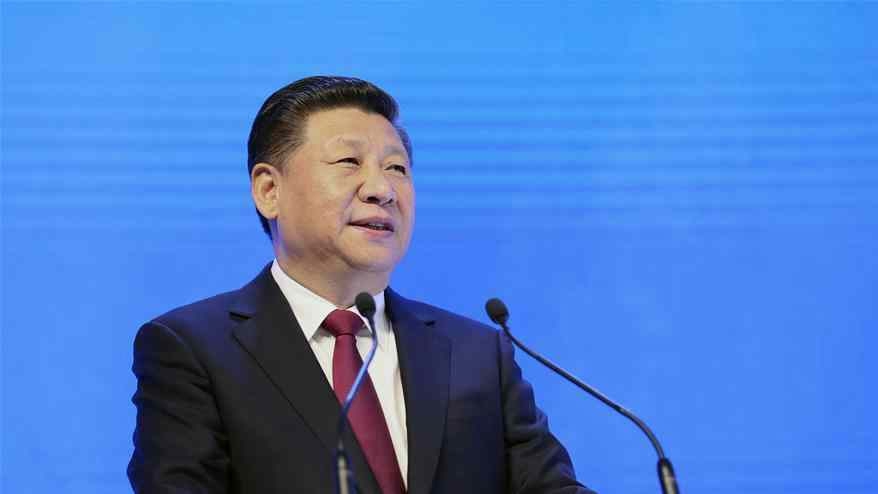In his report to the 19th National Congress of the Communist Party of China (CPC) in October last year, President Xi Jinping stressed that the country aimed to foster a new type of international relations and build a community with a shared future for mankind, which has set tones for Chinese diplomacy in new era.
Since the 18th National Congress of the Communist Party of China five years ago, the Chinese leader participated in nearly 40 bilateral and multilateral activities.
After the 19th CPC National Congress, the series of frequent diplomatic activities by the Chinese leader has sent out a signal of open, pragmatic and confident diplomacy in the “New Era.”
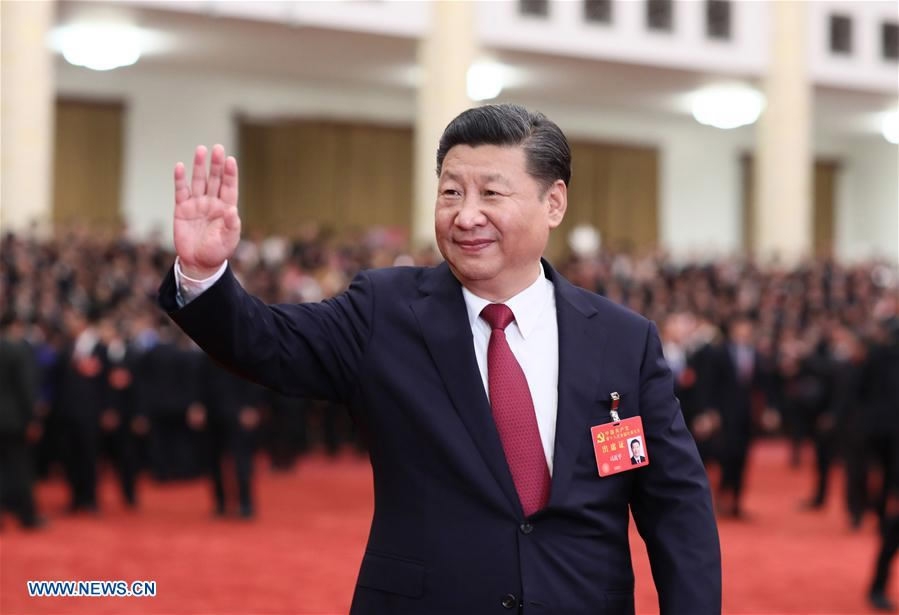
Xi Jinping, general secretary of the Communist Party of China (CPC) Central Committee, who is also Chinese president and chairman of the Central Military Commission, meets with delegates, specially invited delegates and non-voting participants of the 19th CPC National Congress at the Great Hall of the People in Beijing, capital of China, Oct. 25, 2017. /Xinhua Photo
Xi Jinping, general secretary of the Communist Party of China (CPC) Central Committee, who is also Chinese president and chairman of the Central Military Commission, meets with delegates, specially invited delegates and non-voting participants of the 19th CPC National Congress at the Great Hall of the People in Beijing, capital of China, Oct. 25, 2017. /Xinhua Photo
Open a successful chapter
"We should uphold multilateralism, pursue shared growth through consultation and collaboration, forge closer partnerships, and build a community with a shared future for mankind."
- Xi Jinping, in Da Nang, Vietnam
Xi’s first oversea trip after the Party’s national congress started with his attendance at the APEC meeting in Da Nang, Vietnam, while also paying state visits to two neighboring countries, namely Vietnam and Laos.
The trip, which according to Chinese Foreign Minister Wang Yi, opened a successful chapter of Chinese diplomacy after the 19th CPC National Congress.
It “demonstrates the confidence in path, theory, system and culture of socialism with Chinese characteristics,” Wang Yi told reporters.
In his speech made during the APEC meeting, Xi elaborated how China’s advocacy of new type of international relations could contribute to the regional development.
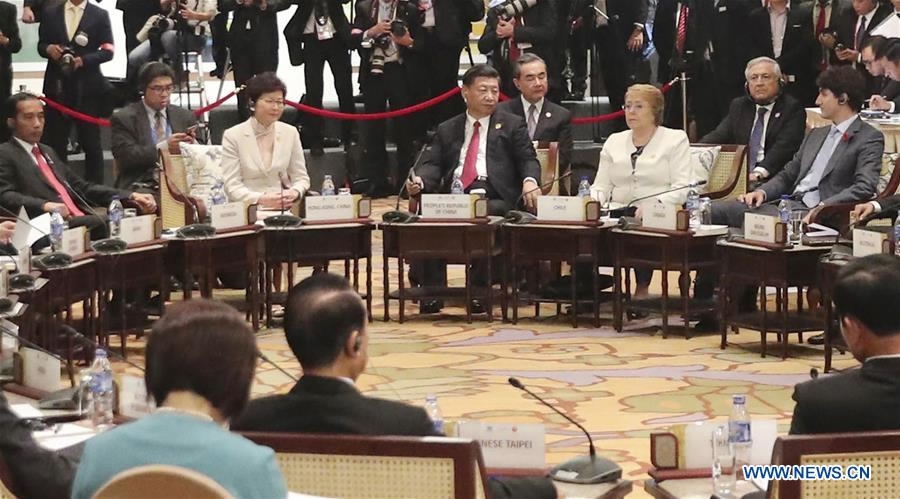
Chinese President Xi Jinping attends an informal dialogue between leaders from the Asia-Pacific Economic Cooperation (APEC) and the Association of Southeast Asian Nations (ASEAN) in Da Nang, Vietnam, Nov. 10, 2017. /Xinhua Photo
Chinese President Xi Jinping attends an informal dialogue between leaders from the Asia-Pacific Economic Cooperation (APEC) and the Association of Southeast Asian Nations (ASEAN) in Da Nang, Vietnam, Nov. 10, 2017. /Xinhua Photo
Xi promoted peaceful development, economic prosperity and win-win cooperation in the Asia-Pacific region, which well-echoed the top-level design for China's diplomacy at the 19th CPC National Congress.
His state visits after the APEC also injected a stronger impetus into China-Vietnam and China-Laos relations, as China signed nearly 20 cooperation agreements with Vietnam and Laos respectively and issued joint statements respectively, which epitomize high degree of political consensus on working together for a common cause and a bright future.
Fruitful achievements in bilateral relations
“China will not close its door to the world; we will only become more and more open.”
- Xi Jinping, the report to the 19th CPC National Congress.
The bilateral cooperation between China and the US has been strengthened as US President Donald Trump paid a “successful and historic” visit to China – he was the first country leader coming to Beijing after the 19th CPC National Congress.
The two leaders witnessed the signing of a lucrative package of trade worth 253.5 billion US dollars and agreed further cooperation in various issues including the DPRK tension.
The world's top two economies have walked towards to a healthier and more stable bilateral relation.
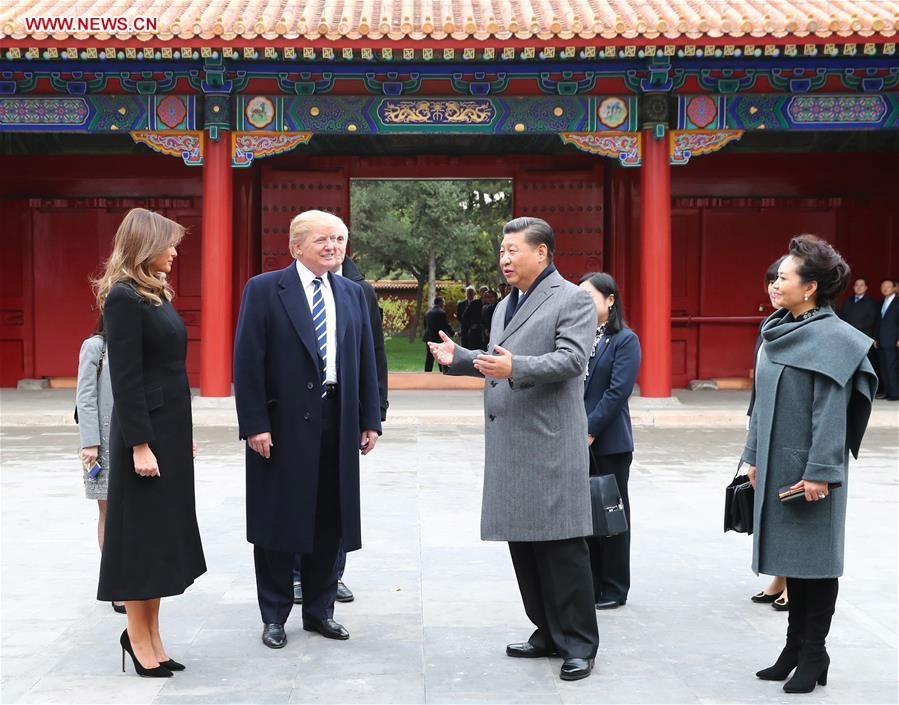
Chinese President Xi Jinping (2nd R) and his wife Peng Liyuan (1st R) welcome US President Donald Trump (2nd L) and his wife Melania Trump at the Palace Museum, or the Forbidden City, in Beijing, capital of China, Nov. 8, 2017. /Xinhua Photo
Chinese President Xi Jinping (2nd R) and his wife Peng Liyuan (1st R) welcome US President Donald Trump (2nd L) and his wife Melania Trump at the Palace Museum, or the Forbidden City, in Beijing, capital of China, Nov. 8, 2017. /Xinhua Photo
China embraced a wave of “European season” in Chinese diplomacies in the first two months of 2018 – French President Macron, British Prime Minister Theresa May and the King of the Netherlands, as well as parliamentary leaders from Nordic and Baltic countries.
China will step up cooperation with both France and Britain under the framework of Belt and Road Initiative – Macron said the cooperation has “strategic meaning” for both countries. While business groups led by Prime Minister May signed a worthy of 10 billion yuan cooperation deal for the next five years.
Meanwhile, the visit of the president of the Republic of Korea Moon Jae-in at the end of 2017 strengthened ties and set out foundations of full-scale cooperation between the two countries especially in efforts to achieve the denuclearization on the Korean Peninsula.
Move towards a ‘shared future’
“The Chinese people are willing to join all peoples of the world in creating a beautiful future of greater prosperity and greater peace for mankind.”
- Xi Jinping, 2018 New Year speech.
Firstly introduced in 2015, the concept of building a community with a shared future for mankind came to the world stage after Xi further elaborated the concept in January last year during the World Economic Forum in Davos.
The concept was written into the Party’s Constitution after the 19th CPC National Congress and also later incorporated into the UN resolutions in November, 2017.
In December last year, at the opening ceremony of CPC in Dialogue with World Political Parties High-Level Meeting, Xi addressed parties' leaders around the world and called on transforming the initiative from a concept into action.
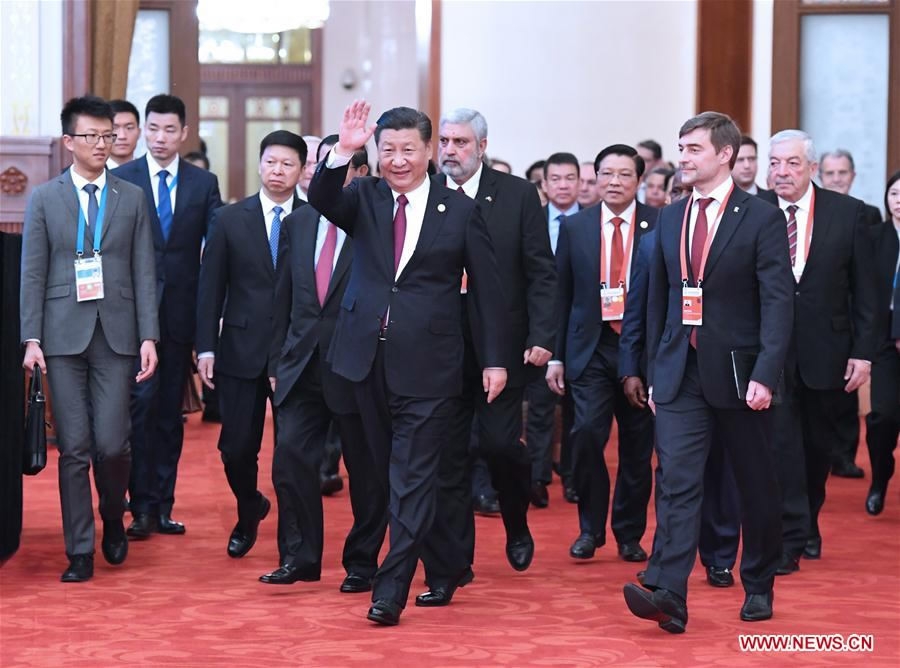
Xi Jinping, general secretary of the Communist Party of China (CPC) Central Committee, walks with foreign guests to attend the opening ceremony of CPC in Dialogue with World Political Parties High-Level Meeting in Beijing, capital of China, Dec. 1, 2017. /Xinhua Photo
Xi Jinping, general secretary of the Communist Party of China (CPC) Central Committee, walks with foreign guests to attend the opening ceremony of CPC in Dialogue with World Political Parties High-Level Meeting in Beijing, capital of China, Dec. 1, 2017. /Xinhua Photo
The Belt and Road Initiative is the practice of the concept, Xi said, adding the initiative has become a huge cooperation platform for countries concerned to realize their common development.
Proposed by Xi in 2013, the Belt and Road Initiative aims to build trade and infrastructure networks connecting Asia with Europe and Africa via land and maritime routes.
Xi further emphasized the significance of an open and inclusive world, urging the world to break cultural barriers and let all kinds of civilizations exist and grow in harmony.
During his 2018 New Year Address, Xi stressed again the country’s resolution for building a shared future for the world.
“China will act as a builder of world peace and a contributor to global development, and an upholder of the international order,” Xi said on the last day of 2017.
According to Chinese Foreign Minister Wang Yi, China can expect a world of “greater openness and less isolation” and a world of “more cooperation and less friction” in 2018. The country will broaden cooperation and narrow differences with the world to jointly build a community of shared future.
(Top image: Chinese President Xi Jinping delivers a keynote speech at the opening plenary of the 2017 annual meeting of the World Economic Forum in Davos, Switzerland, Jan. 17, 2017. /Xinhua Photo)

